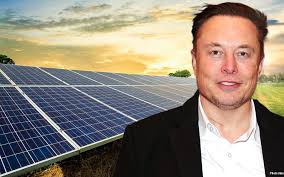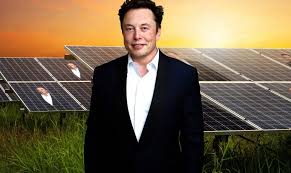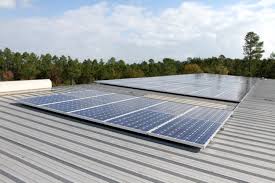Elon Musk Provides Solar Tech for Disaster Relief Through Musk Foundation
- NgocAnh
- March 31, 2025

Elon Musk Provides Solar Tech for Disaster Relief Through Musk Foundation
Introduction: Innovating Disaster Relief with Solar Technology
In an unprecedented move that combines technological innovation and humanitarian aid, Elon Musk, the visionary entrepreneur behind Tesla and SpaceX, has pledged to provide solar technology for disaster relief efforts through the Musk Foundation. As global climate change intensifies natural disasters such as hurricanes, wildfires, and earthquakes, the need for reliable, portable, and sustainable energy sources in affected areas has never been more urgent. Musk’s initiative seeks to address this challenge by harnessing the power of solar energy, a renewable resource that can be deployed rapidly to provide life-saving support in disaster-stricken regions.
Through the Musk Foundation, a non-profit organization dedicated to solving critical issues such as renewable energy and disaster relief, Musk aims to leverage Tesla’s cutting-edge solar technology and Powerwall batteries to offer immediate relief to communities in crisis. This initiative is a part of Musk’s broader commitment to advancing sustainable energy solutions and making them accessible to those in greatest need. The deployment of solar energy solutions is expected to significantly enhance the resilience of communities affected by natural disasters, providing them with a steady supply of power when traditional infrastructure is compromised or destroyed.
The Power of Solar Tech: A Sustainable Solution for Disaster Areas
One of the key components of Musk’s disaster relief effort is the integration of Tesla’s solar products, including solar panels and Powerwall batteries, into the recovery process. Solar panels are known for their ability to generate electricity in a wide variety of environments, making them ideal for deployment in disaster-stricken areas where grid power is unavailable or unreliable. Solar power, unlike fossil fuel-based generators, is not only clean and renewable but also highly portable, making it suitable for rapid deployment.
The Powerwall, a home battery storage system developed by Tesla, complements solar panels by storing excess energy for later use. In disaster zones, where electricity can be scarce or unavailable for long periods, Powerwall batteries can provide critical backup power for homes, hospitals, shelters, and water purification systems. The integration of solar energy and battery storage ensures that affected communities have access to continuous electricity, even when the main power grid is offline.
In addition to its obvious environmental benefits, this technology also reduces reliance on diesel-powered generators, which are often used in disaster recovery but contribute significantly to air pollution and are costly to operate. By offering solar-powered solutions, Musk’s initiative represents a step toward reducing the environmental impact of disaster relief operations while simultaneously providing communities with the power they need to survive and rebuild.
Expanding Access: How Solar Tech Can Transform Disaster Relief Operations
The impact of Musk’s solar initiative extends beyond providing immediate relief to disaster-stricken areas. The project also aims to create long-term solutions by integrating solar technology into ongoing disaster recovery operations. In many cases, traditional energy infrastructure in disaster zones is completely destroyed, and rebuilding efforts can take months or even years to restore access to the power grid. Solar energy, however, can be deployed quickly and at scale, offering a much-needed bridge to a more sustainable and resilient future for these communities.
In addition to providing power to homes and shelters, solar energy solutions can also support critical infrastructure such as medical facilities, water treatment plants, and communication systems. For instance, during a natural disaster, healthcare facilities often face power outages, making it difficult to operate life-saving equipment such as ventilators, refrigeration for vaccines, and lighting in emergency rooms. By providing these facilities with solar-powered electricity, the Musk Foundation’s initiative ensures that medical teams can continue to operate in the critical hours following a disaster.
Furthermore, the deployment of solar-powered mobile units can serve as a flexible and scalable solution in areas where infrastructure has been completely wiped out. These units can be used to provide power for community centers, disaster response coordination hubs, and mobile clinics. By leveraging solar technology, the Musk Foundation’s initiative can help local governments and NGOs respond more effectively to disasters, ensuring that the needs of the affected population are met in a timely manner.
A Global Impact: Partnerships and Future Plans
The Musk Foundation’s solar disaster relief initiative is just one part of a broader effort to address global challenges such as climate change, energy access, and disaster preparedness. Musk’s long-standing commitment to sustainability is evident in his leadership of Tesla and SpaceX, both of which focus on developing technologies that reduce humanity’s dependence on fossil fuels and promote the use of renewable energy. Through the Musk Foundation, these values are now being applied to disaster relief, demonstrating Musk’s belief in the power of innovation to address some of the world’s most pressing challenges.
Looking ahead, the Musk Foundation plans to expand its solar disaster relief efforts to regions around the world that are most vulnerable to natural disasters. This includes areas that have experienced frequent hurricanes, earthquakes, or wildfires, as well as regions with limited access to energy infrastructure. By partnering with local governments, humanitarian organizations, and disaster response teams, the Musk Foundation aims to ensure that solar technology is readily available to communities that need it the most.
As part of this expansion, the Musk Foundation is also exploring opportunities to collaborate with other leaders in renewable energy, such as solar energy companies and philanthropic organizations, to scale up the deployment of solar solutions. With Musk’s influence and Tesla’s technological expertise, the initiative has the potential to revolutionize the way disaster relief is conducted, making it more sustainable, efficient, and impactful.
In conclusion, Elon Musk’s solar disaster relief initiative represents a transformative shift in how we approach disaster recovery. By leveraging the power of solar energy and storage solutions, Musk is not only providing immediate relief to communities in crisis but also building the foundation for a more resilient and sustainable future. As the world continues to face the growing threat of natural disasters, Musk’s commitment to renewable energy and disaster relief will undoubtedly play a pivotal role in shaping the future of global humanitarian efforts. Through innovation, collaboration, and a shared vision of a better world, Musk is proving that technology can be a powerful force for good in times of crisis.






